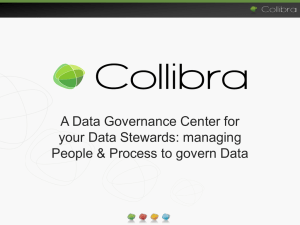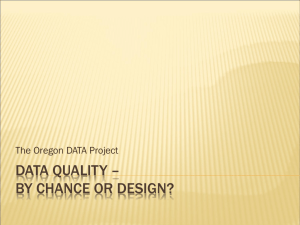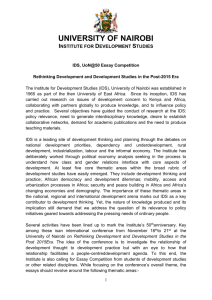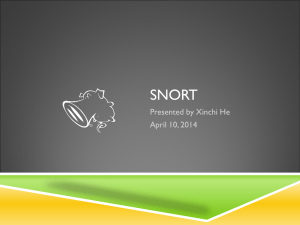Data Management Definitions - The University of Texas at Austin
advertisement
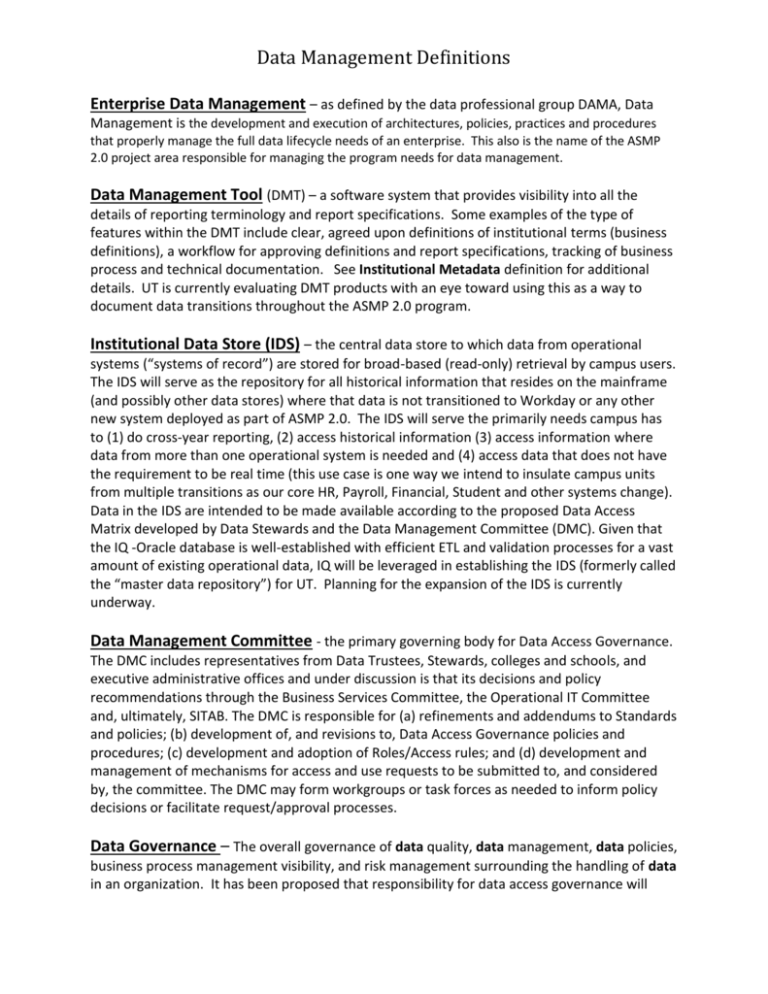
Data Management Definitions Enterprise Data Management – as defined by the data professional group DAMA, Data Management is the development and execution of architectures, policies, practices and procedures that properly manage the full data lifecycle needs of an enterprise. This also is the name of the ASMP 2.0 project area responsible for managing the program needs for data management. Data Management Tool (DMT) – a software system that provides visibility into all the details of reporting terminology and report specifications. Some examples of the type of features within the DMT include clear, agreed upon definitions of institutional terms (business definitions), a workflow for approving definitions and report specifications, tracking of business process and technical documentation. See Institutional Metadata definition for additional details. UT is currently evaluating DMT products with an eye toward using this as a way to document data transitions throughout the ASMP 2.0 program. Institutional Data Store (IDS) – the central data store to which data from operational systems (“systems of record”) are stored for broad-based (read-only) retrieval by campus users. The IDS will serve as the repository for all historical information that resides on the mainframe (and possibly other data stores) where that data is not transitioned to Workday or any other new system deployed as part of ASMP 2.0. The IDS will serve the primarily needs campus has to (1) do cross-year reporting, (2) access historical information (3) access information where data from more than one operational system is needed and (4) access data that does not have the requirement to be real time (this use case is one way we intend to insulate campus units from multiple transitions as our core HR, Payroll, Financial, Student and other systems change). Data in the IDS are intended to be made available according to the proposed Data Access Matrix developed by Data Stewards and the Data Management Committee (DMC). Given that the IQ -Oracle database is well-established with efficient ETL and validation processes for a vast amount of existing operational data, IQ will be leveraged in establishing the IDS (formerly called the “master data repository”) for UT. Planning for the expansion of the IDS is currently underway. Data Management Committee - the primary governing body for Data Access Governance. The DMC includes representatives from Data Trustees, Stewards, colleges and schools, and executive administrative offices and under discussion is that its decisions and policy recommendations through the Business Services Committee, the Operational IT Committee and, ultimately, SITAB. The DMC is responsible for (a) refinements and addendums to Standards and policies; (b) development of, and revisions to, Data Access Governance policies and procedures; (c) development and adoption of Roles/Access rules; and (d) development and management of mechanisms for access and use requests to be submitted to, and considered by, the committee. The DMC may form workgroups or task forces as needed to inform policy decisions or facilitate request/approval processes. Data Governance – The overall governance of data quality, data management, data policies, business process management visibility, and risk management surrounding the handling of data in an organization. It has been proposed that responsibility for data access governance will Data Management Definitions reside with the Data Management Committee and its decisions and policy recommendations will be submitted through the Business Services Committee, the Operational IT Committee and, ultimately, to SITAB. Data Continuity - the compatibility of past, present and future data in a way that allows analysis and reporting independent of system changes, definitional changes or technology platform differences. Data Access - software and activities related to storing, retrieving, or acting on data housed in a database or other repository. Strategic Reporting – The type of reporting that answers questions addressing progress, outcomes, and performance with respect to specific institutional goals or reports produced for governing bodies. Operational Reporting – The type of reporting that answers questions for operations and is used by front line staff, managers, and processing units in order to facilitate institutional operations and enable sound decisions to be made. Institutional Data – any data element captured, extracted or derived from institutional administrative information systems or residing in the Institutional Data Store (IDS) or an associated central administrative data store. Specifically, data captured and stored by source systems, or systems of record, or made available in the MDR or its affiliated databases. Institutional information - a collection of institutional data which may be derived, aggregated, calculated, or contained In any form, Including but not limited to documents, memos, databases, spreadsheets, presentations, tables, charts, graphs, email and web sites. Institutional Metadata – detailed information describing both the technical and business characteristics of institutional data, including: a. Definitions regarding the purpose, use and context of Institutional Data b. Identification of which system is the official system of record of Institutional Data c. Identification of personnel responsible for management of Institutional Data d. Descriptions of how Institutional Data Is transferred, derived, and stored e. Specific security and privacy practices that are used to safeguard Institutional Data f. Risk and compliance classifications for Institutional Data g. Rules concerning retention of records and Institutional Data Source System or System of Record – the system by which any given institutional data originate, are captured, or are initially processed is the “source system.” The “system of record” is the authoritative system that defines and maintains a specific subset of institutional data (i.e. the registration system is the system of record for student course enrollments). In most cases, the System of Record is also the Source System. However, there are cases in which source Data Management Definitions system data are further aggregated or refined to produce official institutional information, resulting in a separate authoritative System of Record for specific purposes (i.e. 12 th Class Day data). Departmental and Collateral Repositories – any of a number of departmental databases or systems that process or present data to serve non-centralized administrative business needs; these repositories may also redundantly store institutional data to support remote or independent processes for use in specific units (i.e. not for official institutional or campus-wide use). Redundant Data Store – data that are available in the IDS but which are also stored on a departmental or individual server, often for access by non-central administrative processes which could likely be fed directly from the IDS. Redundant data stores refers to systematic or large-scale repositories and not to individual spreadsheets or one-time ad hoc local databases such as for the purpose of performing additional calculations, formatting, strategic analysis, or transmittal. Subject Area Domains - broad functional/operational areas for which major information systems and databases are defined (i.e. “Research,” “Faculty,” “Fee Billing,” Financial Aid,” “Admissions,” “Facilities,” etc.). Domains generally have one Data Steward (though there may be several) representing the system(s) that form a given subject area. Institutional Data Map – the formal reference document that associates each Subject Area Domain with its Data Steward(s) and Trustee (i.e. business experts or “responsible parties”). Data Access Matrix – the formal reference document that describes major data subject area domains, the risk categories for specific data within each area, the roles of individuals to be granted access to the data, and the level of granularity and scope of access for each role. The Data Access Matrix is developed and maintained by the Data Steward for each subject area and adopted and approved by the DMC. External Entity – any person or organization not formally affiliated with UT Austin, including, but not limited to: professional organizations, conference attendees, media, legislators or their staff members, governing boards or administrative officials, other UT institutions, accreditors, state or federal agencies, research associates from other institutions, or any member of the general public (i.e. including public-facing web sites). Non-Operational Use – access to, manipulation, or consumption of data for purposes other than those which serve the common good of the university community or further its effectiveness in achieving the institutional mission (such as those which facilitate administrative processes or provide strategic insight for improved management of the institution). Examples of non-operational use include individual faculty research projects, support for individual theses or dissertations, or for uses that serve only the immediate needs of a single individual or unit with no alignment with, or benefit to, institutional strategic initiatives. Data Management Definitions Associated Central Administrative Data Store – database or server that is populated by central administrative systems or processes, or used for strategic institutional or reporting purposes, but which contains data not held in the formal IQ/IDS. An example would be facilities data maintained by Campus Planning and Facilities Services and held in the FAMIS database. There is an implied link between this databases and the IQ/IDS, with the ability to access data across servers. Processing Unit – a central administrative office responsible for capturing and manipulating data to facilitate operational processes, such as payroll, fee billing, registration, etc. Processing units are usually managed by a Data Steward or Data Trustee and have Steward Analysts on staff. College Unit – offices reporting to a dean rather than central administration, but which may engage in localized data processing or consumption in order to support operations within their college or department. College units may have Application Developers on staff. Data Trustees – VP and Associate VP administrators with portfolio level management responsibilities over Subject Area Domain(s) and their System(s) of Record. Data Trustees are, generally, members of the Business Services Committee; a subset of Data Trustees will provide representation on the Data Management Committee. Data Trustees are ultimately responsible for the appropriate availability and representation of institutional data that originate from their Subject Area Domains or Systems of Record. Data Stewards (custodians) – the operational managers for Subject Area Domain data and Systems of Record. Data Stewards report to a Trustee, though, in some cases, the Steward may also be the Trustee. Data Stewards and their staff have deep knowledge of the System(s) of Record, definitions, processes, and business logic for their domain(s). Data Stewards assist with metadata, modeling, risks assessments, roles/access recommendations, and validation. A subset of Data Stewards will provide representation on the Data Management Committee. IQ Steering Committee– the governing body that preceded the Data Management Committee (DMC). This steering committee has been renamed the Data Management Committee and their scope has been changed to accommodate the increased desire for institutional data access and governance. IQ Sponsors – the existing operational oversight group for IQ will continue in its current role and also assume responsibility for implementation and coordination of the Data Access Governance structure, maintaining a website with current policies and contact information, facilitating DMC meetings and agendas, and communicating decisions and policies to campus constituents. Consumers –the end-user of central data, or the individual accessing and using the data for consumption by a specific audience. Consumers are responsible for ensuring the security, Data Management Definitions appropriate use and dissemination of those data and, to the extent possible, the application of appropriate definitions and methodologies in the presentation of those data, in accordance with all existing UT data policies, including (but not limited to): Acceptable Use Policy Information Resources Use and Security Policy Data Classification Standard Data Encryption Guidelines Federal Education Rights and Privacy Act IQ Team – the central IQ team provides technical expertise to maintain and enhance IQ and the MDR and provide appropriate data quality, security, and availability on a consistent and timely basis. The IQ team is responsible for establishing and maintaining Extract/Transformation/Load (ETL) processes between steward area databases and the IDS, as well as the dimensional modeling of data to meet business and definitional requirements established by the Data Stewards and their analysts. IQ maintains the physical database as well as security schemas and tools for appropriately accessing IDS data. IQ team members work with, and rely upon, steward areas to establish and maintain the accuracy and integrity of steward area data, and to appropriately reflect any changes in the source systems, on a continuous basis. In addition, the IQ team is responsible for the implementation of appropriate backup and recovery strategies for the MIDS. Steward Analysts –personnel within a Steward’s business area who have deep expertise with the systems and specific program logic by which data are captured and categorized, as well as definitions, processing methodologies, and caveats associated with those data. Steward analysts are familiar with data entity relationships, integrations with other steward areas, the timing of data updates, and current or pending changes to the source systems. These processing area analysts play a key role in the successful materialization of source system data in the IQ/IDS and are vital to sustained data accuracy and availability. Steward analysts provide expertise in source system tables, data definitions, joining data across tables, identifying and documenting appropriate business logic, and validating data as it is materialized and modeled. Further, steward analysts are responsible for ensuring that changes to source system data or data structures are communicated to IQ team members so that consistent and appropriate availability of data in the IDS can be maintained. Application Developers – technical personnel who access data from the IDS and perform additional, systematic manipulation of the data for presentation to a specific audience through a programmed interface. Application Developers must ensure that all UT Acceptable Use and Security policies (see above) are followed and that access to institutional data through their systems is consistent with standards defined in the Data Access Matrix. Developers should familiarize themselves with all available documentation on business rules, definitions, and methodologies associated with the manipulation of institutional data and seek advice from steward analysts, as needed, in order to maintain accuracy and consistent use of data throughout the institution.
